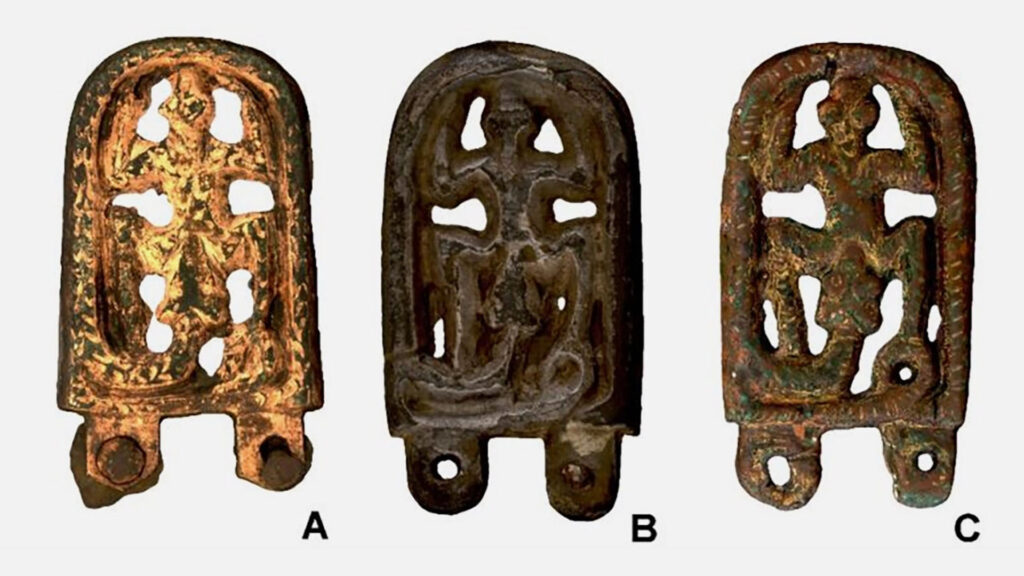A gilded early medieval belt buckle unearthed in the Czech Republic depicts a serpent devouring a frog-like creature, sparking the discovery of a potential new pagan cult that transcended regional boundaries across Central Europe.
Archaeologists first thought the central design — a snake or dragon devouring a frog-like creature — must be unique. But they have since learned that in the past dozen years, almost identical artifacts have been unearthed in Germany, Hungary and elsewhere in the Czech Republic.
“I realized that we were looking at a previously unknown pagan cult that linked different regions of central Europe in the early Middle Ages, before the arrival of Christianity,” Jiří Macháček, an archaeologist at Masaryk University in Brno, said in a statement.
“The motif of a serpent or snake devouring its victim appears in Germanic, Avar and Slavic mythology,” he said. “Today, we can only speculate about its exact meaning, but in the early Middle Ages, it connected the diverse peoples living in Central Europe on a spiritual level.”
Macháček is the lead author of a study in the January issue of the Journal of Archaeological Science describing the belt fitting from Lány and three others like it: one that was found near Iffeldorf in southern Germany, about 200 miles (325 km) southwest of Lány; another found near Zsámbék, Hungary, about 280 miles (450 km) southeast of Lány; and another found near the Czech town of Nový Bydžov, about 70 miles (110 km) east of Lány.

Pagan symbol
Previous research suggests such belt fittings were produced in Central Europe in the seventh and eighth centuries and were usually worn by Avars — a nomadic people, thought to be from the Eurasian Steppe, who settled in the Carpathian Basin of what’s now Hungary beginning in the sixth century.
The Avars established a “khaganate,” or nomadic state, over much of Central Europe, and some of their fashions were adopted by other peoples of the region, many of them Slavs, the researchers said.
Analysis with X-ray fluorescence, scanning electron microscopy and other techniques showed that the objects were originally heavily gilded and that all four were made from copper mined in the Slovak Ore Mountains, which are now in Slovakia.
An analysis of their shapes based on virtual 3D models suggested some of the buckles or fittings came from the same workshop or were made from a common model, using the “lost wax” method of casting bronze.
The researchers said the striking similarity of the objects points to the “existence of a previously unknown pagan cult that connected diverse populations of varying origin during the early Middle Ages.”
It’s not known what the snake — or dragon — and the frog-like creature actually signified. But the researchers noted that fights with a snake or dragon are common in pagan creation myths, as “the counterpoint between two opposing forces representing the central act of cosmogonic … myth,” while the “interaction” between the snake and the frog might be linked to fertility cult practices, they wrote in the study.
Discover:

Europe before Rome:
A Site-by-Site Tour of the Stone, Bronze, and Iron Ages
$53.70 (50% off)
“Price takes readers on a grand tour of prehistoric Europe…. A great book for the lay reader as well as for specialists.”–Brian Renvall, Library Journal
